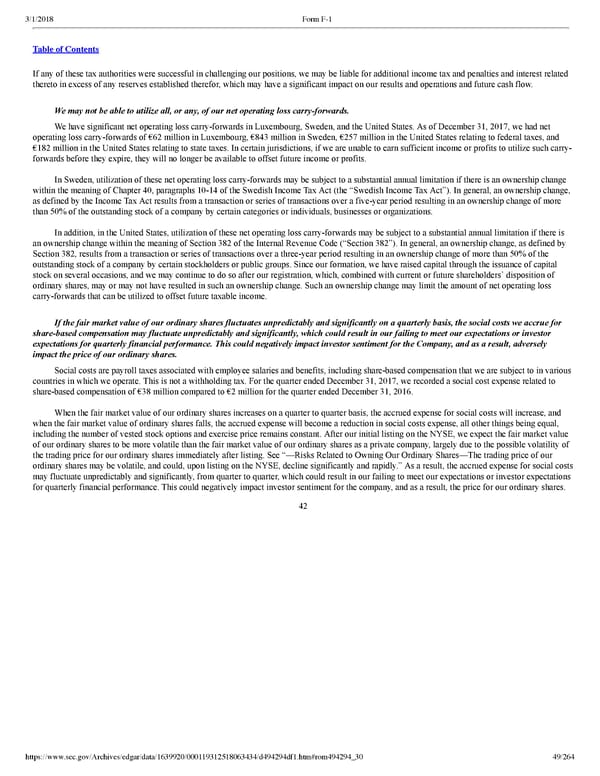49/264 If any of these tax authorities were successful in challenging our positions, we may be liable for additional income tax and penalties and interest related thereto in excess of any reserves established therefor, which may have a significant impact on our results and operations and future cash flow. We may not be able to utilize all, or any, of our net operating loss carryforwards. We have significant net operating loss carryforwards in Luxembourg, Sweden, and the United States. As of December 31, 2017, we had net operating loss carryforwards of €62 million in Luxembourg, €843 million in Sweden, €257 million in the United States relating to federal taxes, and €182 million in the United States relating to state taxes. In certain jurisdictions, if we are unable to earn sufficient income or profits to utilize such carry forwards before they expire, they will no longer be available to offset future income or profits. In Sweden, utilization of these net operating loss carryforwards may be subject to a substantial annual limitation if there is an ownership change within the meaning of Chapter 40, paragraphs 1014 of the Swedish Income Tax Act (the “Swedish Income Tax Act”). In general, an ownership change, as defined by the Income Tax Act results from a transaction or series of transactions over a fiveyear period resulting in an ownership change of more than 50% of the outstanding stock of a company by certain categories or individuals, businesses or organizations. In addition, in the United States, utilization of these net operating loss carryforwards may be subject to a substantial annual limitation if there is an ownership change within the meaning of Section 382 of the Internal Revenue Code (“Section 382”). In general, an ownership change, as defined by Section 382, results from a transaction or series of transactions over a threeyear period resulting in an ownership change of more than 50% of the outstanding stock of a company by certain stockholders or public groups. Since our formation, we have raised capital through the issuance of capital stock on several occasions, and we may continue to do so after our registration, which, combined with current or future shareholders’ disposition of ordinary shares, may or may not have resulted in such an ownership change. Such an ownership change may limit the amount of net operating loss carryforwards that can be utilized to offset future taxable income. If the fair market value of our ordinary shares fluctuates unpredictably and significantly on a quarterly basis, the social costs we accrue for sharebased compensation may fluctuate unpredictably and significantly, which could result in our failing to meet our expectations or investor expectations for quarterly financial performance. This could negatively impact investor sentiment for the Company, and as a result, adversely impact the price of our ordinary shares. Social costs are payroll taxes associated with employee salaries and benefits, including sharebased compensation that we are subject to in various countries in which we operate. This is not a withholding tax. For the quarter ended December 31, 2017, we recorded a social cost expense related to sharebased compensation of €38 million compared to €2 million for the quarter ended December 31, 2016. When the fair market value of our ordinary shares increases on a quarter to quarter basis, the accrued expense for social costs will increase, and when the fair market value of ordinary shares falls, the accrued expense will become a reduction in social costs expense, all other things being equal, including the number of vested stock options and exercise price remains constant. After our initial listing on the NYSE, we expect the fair market value of our ordinary shares to be more volatile than the fair market value of our ordinary shares as a private company, largely due to the possible volatility of the trading price for our ordinary shares immediately after listing. See “—Risks Related to Owning Our Ordinary Shares—The trading price of our ordinary shares may be volatile, and could, upon listing on the NYSE, decline significantly and rapidly.” As a result, the accrued expense for social costs may fluctuate unpredictably and significantly, from quarter to quarter, which could result in our failing to meet our expectations or investor expectations for quarterly financial performance. This could negatively impact investor sentiment for the company, and as a result, the price for our ordinary shares. 42
 Spotify F1 | Interactive Prospectus Page 48 Page 50
Spotify F1 | Interactive Prospectus Page 48 Page 50